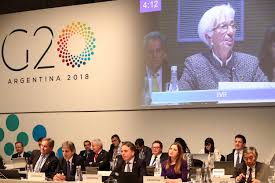 I was speaking to some of my ‘global governance co-conspirators’ recently. We were struggling to describe and capture the consequences for global governance of American policy in this ‘Age of Trump’.
I was speaking to some of my ‘global governance co-conspirators’ recently. We were struggling to describe and capture the consequences for global governance of American policy in this ‘Age of Trump’.
The difficulties were on full display in Buenos Aires this week with the the G20 finance ministers and central bankers meeting. The impact of the tit-for-tat tariffs initiated by the United States, but responded to many of the G20 members, was so apparent as described by Benedict Mander and Chris Giles from the FT. The French Minister spoke for many I suspect when he said: “the EU would not negotiate trade with the US “with a gun to our head.” Tensions are apparent and not mollified by Treasury Secretary Mnuchin suggesting that the retaliatory tariffs are not impacting the United States. G20 Progress is obviously difficult:
This tension is good for no one,” Marcello Estevão, deputy finance minister of Brazil, told a group of journalists on Sunday, betraying clear frustration at the failure to make progress in strengthening multilateralism in international trade.
The shift from anti-protectionist rhetoric and trade liberalization efforts on the part of the G20, to rising protectionist tariffs from the U.S. and responses from many of the G20
Hubert Fuchs, the Austrian finance minister, who attended representing the European Council, said: “Even the minister of the treasury of the US says that he’s in favour of fair and free trade, but the problem is that the US understands something different under fair and free trade”.
And, where does that leave Argentina as current host of the G20? The Macri government began with such energetic hopes. But here the view by the FT journalists:
Barbed comments in Buenos Aires over US tariffs and retaliation from its trading partners overshadowed Argentine President Mauricio Macri’s hopes that the meeting could help to showcase his country’s return to the international community
I suspect that the G20 will need to go further. In the face of Trump chaos, the G20 will likely have to hunker down and work energetically to outlast Trump. It must – using baseball jargon – adopt ‘small ball’. No home runs are possible in the face of Trump Administration disruption. No policy home runs seem possible. The best the G20 can do is to keep member heads down and go for ‘singles’ and ‘doubles’ – incremental policy making for the next while. After all, as one of my American colleagues suggested: we’ll be lucky to make it out of the Trump era with the leader-led Informals intact.
Image Credit: g20.org

